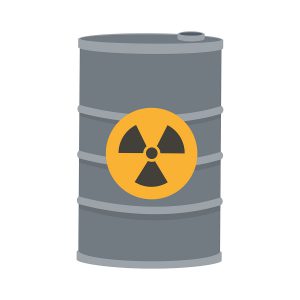When you dispose of expired drugs or pharmaceuticals, you should always take care to do it properly—especially because certain types of drugs are considered legally hazardous by the Environmental Protection Agency (EPA), and their disposal must be handled in a very specific manner.
Learning the different categories of hazardous waste and exactly how to manage and dispose of them takes time. Complying with these stringent regulations can be complicated, but using a medical waste disposal service makes the entire process easier. You end up saving valuable time and resources while staying within the law without even trying.
This article will help you understand the basics of the Resource Conservation Recovery Act (RCRA) and how it defines hazardous pharmaceutical waste. You’ll learn how to manage and dispose of hazardous materials so that you and your company can stay compliant while keeping the environment and your own community safe.
Hazardous Pharmaceutical Wastes
 RCRA provides a framework outlining the proper disposal and management of hazardous and non-hazardous waste. It was created by the EPA to protect communities and the environment from harmful materials.
RCRA provides a framework outlining the proper disposal and management of hazardous and non-hazardous waste. It was created by the EPA to protect communities and the environment from harmful materials.
While state governments ultimately have the power to implement their own hazardous waste disposal programs, the RCRA program regulates hazardous waste by creating explicit rules that state governments without a program must follow, and that established state programs may mimic or adopt.
RCRA identifies pharmaceuticals that are known to be dangerous to people, animals, and the environment as hazardous waste, and details how to manage them. When disposing of hazardous pharmaceutical waste it is recommended that you use a hazardous waste disposal company so that everything is done correctly.
The EPA uses two main descriptors to help define hazardous waste: characteristic wastes and listed wastes.
Characteristic wastes are substances known and tested to have the following traits which deem them hazardous:
- Ignitability
- Reactivity
- Corrosivity
- Toxicity
 Listed wastes are marked with any of the above traits and are specifically listed under these four classifications:
Listed wastes are marked with any of the above traits and are specifically listed under these four classifications:
- F-listed drugs are from nonspecific sources and are generated during manufacturing processes at a variety of facilities. Some of these substances, such as acetone, toluene, methanol, and xylene may be pertinent to healthcare facilities.
- K-listed drugs are from specific sources and are generated during facility manufacturing processes. There is an entire subsection here relating to veterinary pharmaceuticals manufacturing.
- P-listed drugs are acutely toxic unused pharmaceuticals, chemicals, and pesticides such as arsenic, arsenic trioxide, epinephrine, and cyanide salts.
- U-listed drugs are toxic unused pharmaceuticals, chemicals, and pesticides including acetone, acetyl chloride, and azaserine.
You can take a look at a full list of the substances defined by RCRA as hazardous waste, but a complete understanding of the entirety of RCRA is extremely difficult, and cooperation with regulations may require the help of medical waste disposal experts.
Utilize Source Segregation When Disposing of Pharmaceutical Waste
To follow all federal and state laws, you’ll need to correctly segregate, or separate, your different kinds of medical waste before disposing of them. Hazardous wastes should be separated from non-hazardous wastes and sorted according to the above characteristics and lists.
The types of containers you should use for hazardous pharmaceutical waste disposal vary based on state regulations. If you use a medical waste disposal service provider, they will set you up with the correct legal disposal containers for every type of waste you have.
Other Types of Medical Waste that Require Special Handling
Controlled or Scheduled Substances
These substances are defined by the Controlled Substances Act of 1970. These addictive drugs must be destroyed according to the Drug Enforcement Agency’s instructions, and the destruction process must be witnessed. There is some overlap between controlled substances and hazardous wastes, and therefore disposal should follow RCRA and Department of Transportation regulations.
Trace Chemotherapy
Also known as RCRA empty waste, trace chemotherapy waste contains less than 3% of the original content of chemotherapy byproduct. This type of waste is not considered RCRA hazardous, but it is a best practice to separate it from all other types of waste, label it for incineration, and dispose of it at a designated facility.
Need Help Determining If You Have Hazardous Pharmaceutical Waste? Medical Waste Pros Can Help!
It’s vital that you properly dispose of any hazardous pharmaceutical waste you generate so that you don’t harm your environment or any community members. Keeping up with current waste disposal laws can be tough, but using a medical waste service provider makes all the difference.
Medical waste disposal companies have the knowledge and tools to correctly dispose of your hazardous medical waste and will help maintain the legality of your practice. Medical Waste Pros will quickly connect you to the best waste disposal companies in your area, and get you a fair price on your service.
Fill out the form on the right or call us today at (888) 755-6370 for free quotes on services near you!







